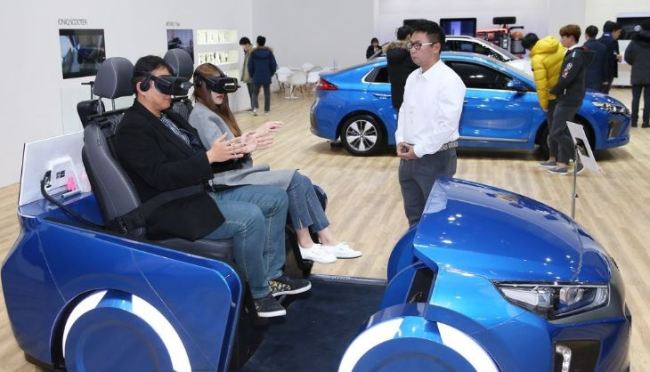Kwon was attending the Daegu International Future Auto Expo at which the vice chairman was one of the keynote speakers.
There has been speculation in the industry on the growing rivalry between the two conglomerates -- the nation’s two largest business groups by asset size and revenue -- as Samsung has jumped into the vehicle component business.
Industry watchers have raised the possibility of Samsung manufacturing electric vehicles powered by lithium ion batteries, which would require fewer car components than traditional vehicles.
Samsung has been denying rumors that it will return to the auto industry. It has had no presence in automaking since its complete withdrawal from the sector in 2000.
However, some experts have said that a partnership between Samsung, the world’s largest maker of microchips and smartphones, and Hyundai, the world’s fifth-largest carmaker, would produce synergy.
"The key reason Hyundai does not partner with Samsung is that Hyundai chairman Chung Mong-koo does not want to work with Korean firms. He views Korean firms as less competitive than Western firms," a source familiar with the matter said.
"It also took several years for LG Electronics to supply its electronic components to Hyundai," the source said.
Based on the partnership with Hyundai, LG is expanding the supply of electronic components to European automakers.
Last year, Samsung Display and Hyundai were in talks to supply Samsung's organic light-emitting diode panels for Hyundai Motor’s luxury sedan Genesis. The discussions collapsed as Hyundai wanted some samples first before signing the deal, and Samsung refused to do that out of fear of technology leaks.
Apart from the quality issue, Hyundai views that its already struggling market share will see more competition as Korea's largest conglomerate jumps into the automobile market.
Samsung Group Chairman Lee Kun-hee had spearheaded the company’s automobile unit, but sold it to Renault 16 years ago. As part of its future growth strategy, the South Korean conglomerate has revived its ambition in automobiles, in particular the rapidly growing vehicle components market, which is expected to grow from $54.2 billion last year to $186.4 billion by 2025. Last year, the tech giant acquired Harman International, a leading vehicle component maker, for 10 trillion won ($9.18 billion).
In his speech at the expo, the vice chairman said the company would ramp up efforts to lead the auto market through research and development investment, and partnerships with other firms
“Hyundai Motor will continue putting efforts into developing green cars, while continuing its R&D investment in future mobility,” said Kwon, who heads the carmaker’s R&D sector.
By 2020, Hyundai Motor plans to roll out 31 eco-friendly vehicles by 2020, an attempt to increase its market footing in the global industry, which is competing to create greener cars. Hyundai’s green car line up includes 10 hybrid cars, 11 plug-in hybrids, eight pure EVs and two fuel cell EVs, he said.
Kwon also addressed challenges of R&D in the automotive industry over changes in value. Cars will become the core element of the sharing economy, shifting its value as an individual possession, he said.
Hyundai Motor also displayed its next generation hydrogen fuel cell sport utility vehicle at the expo, and said it had the longest driving range.
Hyundai Mobis, an auto parts unit of Hyundai Motor, also joined the event to introduce autonomous-driving related technologies. Hyundai Mobis currently owns some 1,600 patents related to self-driving here, it said.
A total of 251 local and overseas companies joined the event to share their technologies. They included the local units of Microsoft and automotive-vision-systems giant Mobileye. Officials from Chinese battery producer BYD and car audio equipment maker Harman also particiapted the expo.
Electric carmaker Tesla also showcased its Model X, for the first time in South Korea.
By Shin Ji-hye (
shinjh@heraldcorp.com)
and Shim Woo-hyun (ws@heraldcorp.com)
Staff reporter Cho Chung-un contributed to this article. – Ed.








